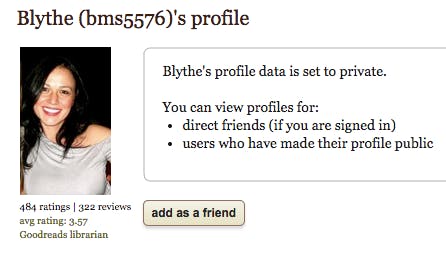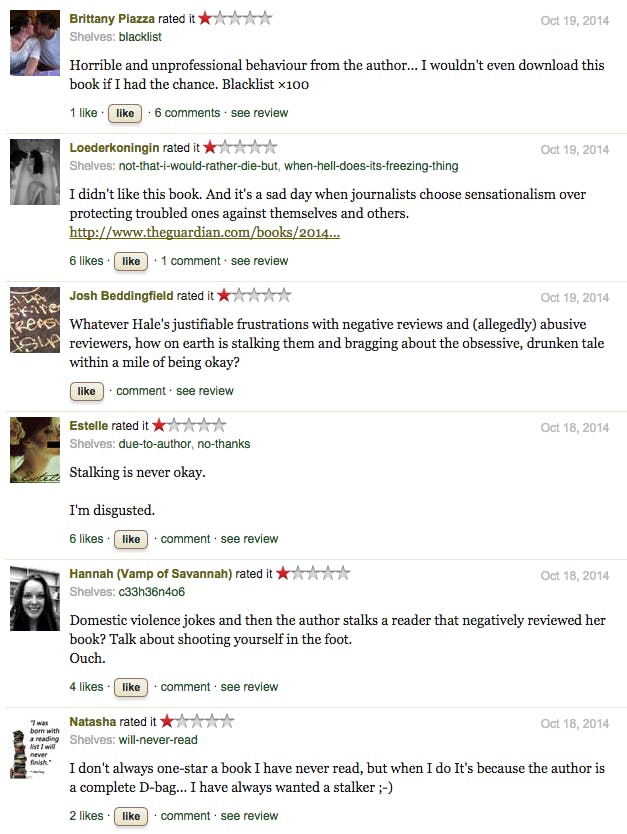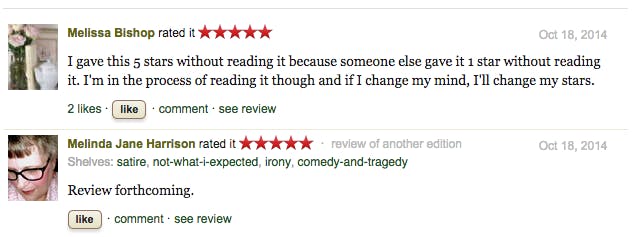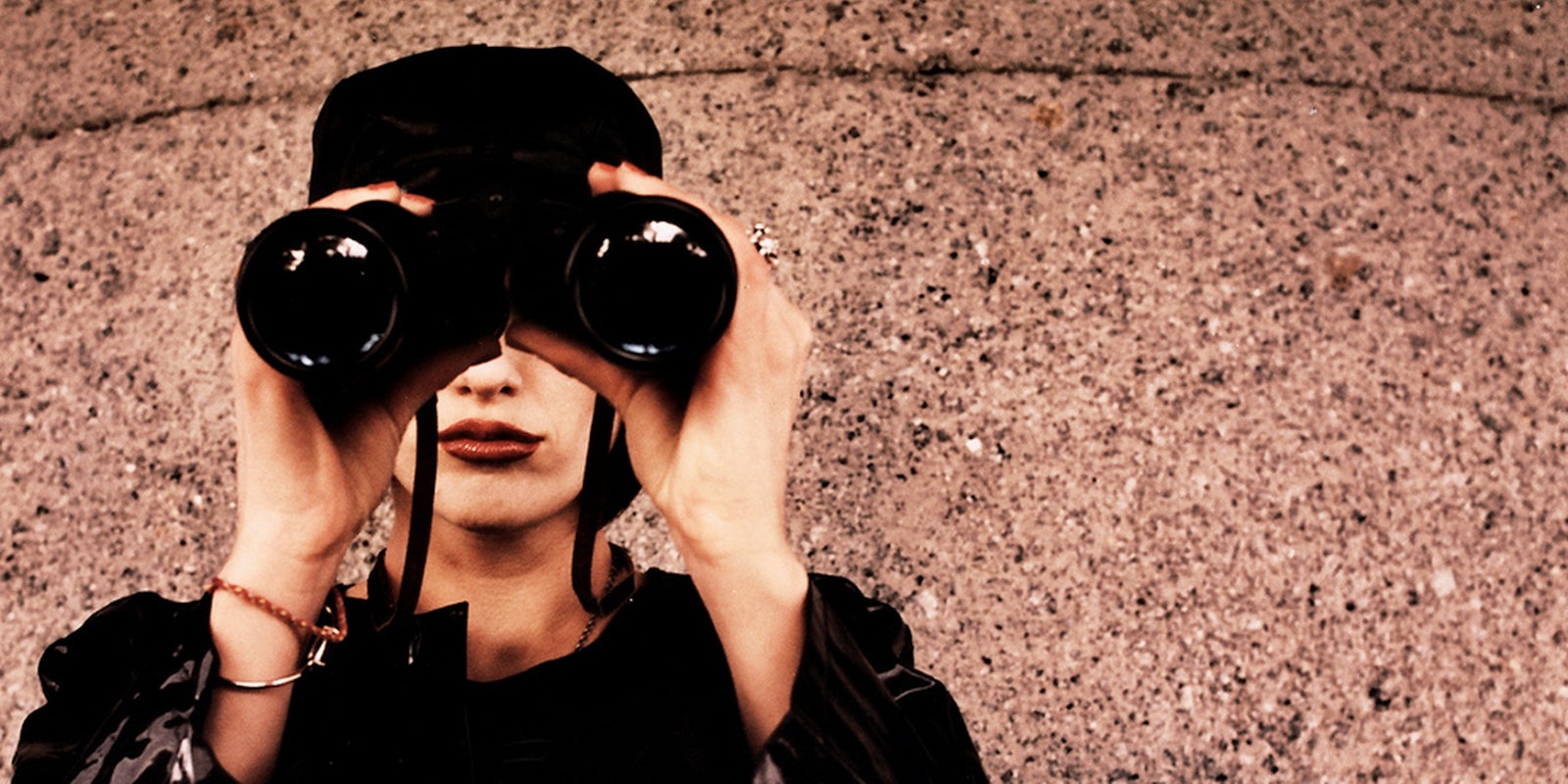Lest you think #Gamergate is the only industry scandal with paranoids trying to ruin one anothers’ lives under the guise of a quest for integrity, I direct you to this chilling Guardian essay by Kathleen Hale, a YA author who recounts her efforts to monitor, stalk, and ultimately unmask a pseudonymous book blogger who trashed her debut novel on a review site.
We’ve seen that even a mild critique from a reader can trigger a sequence of self-destruction that plays out online for everyone to see, but the one-star Goodreads review of No One Else Can Have You that sparked Hale’s obsession was less than civil by design: “Fuck this,” it begins. “I think this book is awfully written and offensive; its execution in regards to all aspects is horrible and honestly, nonexistent.” Blasting the novel’s sexual politics and approach to matters of mental health, specifically PTSD, the blogger, a “Blythe Harris,” concludes that it’s one of the worst she’s read in her life.

It’s posts like that that have landed Blythe, as Hale soon discovered, on a list of so-called Goodreads bullies, reviewers of varying influence who have been known to engage in flamewars with authors they don’t like—at least when those authors take the bait. Hale, though repeatedly warned of this trap, walked, um, blithely into it, choosing to cyberstalk rather than block her tormentor, who began to wage a Twitter campaign against her as well.
“I prowled Blythe’s Instagram and Twitter,” Hale writes. “I read her reviews, considered photos of her baked goods and watched from a distance as she got on her soapbox—at one point bragging she was the only person she knew who used her real name and profession online.” Then, encouraged by a mounting suspicion that “Blythe” was an alias used by someone who had lied about her age, appearance, and job, she contrived to get hold of her address and finally traveled there to confront her in person, because only the pop-psych formula of MTV’s Catfish could give her closure. That didn’t pan out, and a phone conversation with the accused troll yielded few answers.
Does anyone actually think that this “Blythe Harris” was in the right? That she didn’t do anything wrong? Because that’s bullshit, people.
— Eden (@edyngrey) October 18, 2014
So please don’t read that Kathleen Hale article and wonder why Blythe might use an alias. Maybe wonder how she feels safe in her own home.
— C.J. Redwine (@cjredwine) October 18, 2014
In the Guardian piece, of course, Hale effectively doxes Blythe, releasing details of her employment, personal life, and identity. She also questions her own sanity or common sense throughout, and half-jokingly tweeted that both she and Blythe were “bananas.” This helped her position with supporters and weakened it with detractors, who lined up to review-bomb No One Else Can Have You as well as Hale’s forthcoming second book, Nothing Bad Is Going to Happen, which won’t hit shelves until next year. It didn’t help that the piece ran on a major news site, a factor some saw as symptomatic of mainstream literary culture’s disdain for Goodreads’ self-appointed book critics.
@HaleKathleen you are absolutely disgusting. Please seek help.
— Kevin Weitzel (@BetweenMyPages) October 18, 2014
@gabydunn thanks man. The piece is self-deprecating and the fact that I am bonkers isn’t news to me. Xx
— Kathleen Hale (@HaleKathleen) October 18, 2014


At issue, as ever, is the fractious, fluid, and Internet-enabled relationship between authors and whatever fandom they’re ostensibly writing for; these literary micro-scandals most often erupt when bullying becomes a two-way street. There’s a sick codependence of victimhood that unites a site like Stop the Goodreads Bullies—which has propped up authors who lashed out at reviewers—and bloggers who have savaged those same “Badly Behaving Authors,” at times mobilizing for boycotts over some “unprofessional” rudeness either slight or imagined.
Clearly both sides have vindictive members who see themselves as defenders of ethical discourse. The lone thing all involved agree upon is that “everyone is entitled to their opinion.” What’s at stake is how, when, where, and why that opinion is imparted, and the range of acceptable reactions. (Goodreads, as Hale notes, continually cautions authors not to comment on negative criticism, even in a civil tone, as it rarely leads to anything good, and authors who weigh in on their contemporaries’ dust-ups do so at their peril.)
Shocked. Saddened and downright sickened by this reply from Ann Rice about #KathleenHale and #BlytheHarris pic.twitter.com/Ht321ycTdC
— L.A. McKendrick (@LexusRanger) October 18, 2014
In this case, many observers found Blythe’s campaign of online abuse overshadowed by Hale’s fixation with her, and the lengths she went to in expanding it. The story echoed another Hale published last year on Thought Catalog: As a 14-year-old, she explains, she stalked and accosted a girl her age, dumping a bottle of hydrogen peroxide on her head as revenge for a claim of molestation she’d leveled against Hale’s mother. Following the attack, Hale continued to keep tabs on her via AOL Instant Messenger, and tried to make contact again.
“It’s me,” I typed. “Could you please just tell me why you did it?” My palms itched. It said that she was typing, but then it didn’t. So I sent a few clarifying messages. […] I was at my dad’s house that night but somehow they still found me. About an hour after I chatted her, there was a knock on the front door. I looked out my bedroom window to see a cop on our stoop. I tucked my nightgown into my sweatpants and shuffled downstairs. My stepmom was already there, chatting with the officer. She gave me a look. “You know that girl has bigger problems than you do,” she snapped, and left me to talk to the policeman.
So: two people significantly invested in their online reputations, with a common history of allowing the Internet to fuel their worst instincts, became entangled in a petty dispute that took on more sinister dimensions. Whatever the damage, both emerge better-known—more liable to be heard, as Hale describes their mutual desire—with a new posse of fans in their corner. And the great conflicted beast that is publishing lumbers on.
